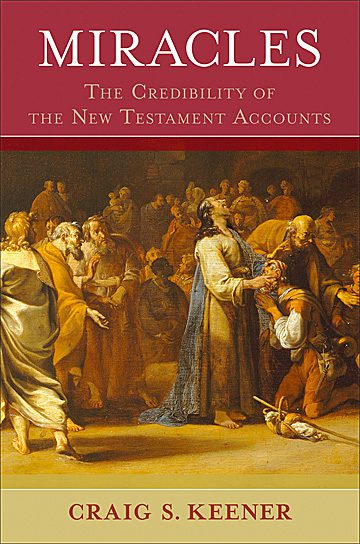A recent issue of Christianity Today magazine featured a fascinating interview with New Testament scholar, Craig Keener. Keener, a prolific scholar who now teaches at Asbury Seminary, recently published a massive two-volume work entitled Miracles: The Credibility of the New Testament Accounts. In his typically encyclopedic fashion, which required 1172 pages, Keener examines the evidence for the miracles in the New Testament. He finds that evidence to be persuasive.
 All of this is not especially surprising, given Keener’s solid, orthodox biblical scholarship. What is surprising, however, is his willingness to examine the evidence for contemporary miracles. Most scholars, even evangelical ones, stay far away from this sort of thing because believing that God does miracles today doesn’t advance one’s scholarly reputation or career. But Keener dares to go into realms that most scholars avoid, looking seriously at the evidence for miracles today.
All of this is not especially surprising, given Keener’s solid, orthodox biblical scholarship. What is surprising, however, is his willingness to examine the evidence for contemporary miracles. Most scholars, even evangelical ones, stay far away from this sort of thing because believing that God does miracles today doesn’t advance one’s scholarly reputation or career. But Keener dares to go into realms that most scholars avoid, looking seriously at the evidence for miracles today.
His willingness to be so unorthodox in his scholarly approach, though orthodox in his theology, reflects Keener’s own life experience. As the Christianity Today article explains, Keener is married to Médine, an African woman, whose religious experience in Africa includes many miracles. In fact, throughout much of Africa today, Christians claim to experience the power of God in amazing ways. Keener decided that, as a scholar, he needed to investigate these claims.
Like any academic book, Miracles is certainly open to scholarly critique. But Kenner has documented what is happening in the world today in such a way that it becomes increasingly irresponsible and parochial for scholars to assume that miracles don’t happen and make this assumption part of the basis for their scholarship. Even if one is not convinced by Keener’s work, he has certainly muddied the water for those who used to see clearly that miracles don’t happen and/or have no rightful role in serious scholarship.
I’m drawing these conclusions, not from the book itself, but from the Christianity Today interview, as well as from my appreciation of Keener’s scholarship. I have greatly appreciated many of his other writings. Since the book is 1172 pages long (in two volumes), and since it cost $35.00, even when discounted at Amazon, I’m waiting for the Kindle version. As soon as Baker releases it, I’ll buy it.










